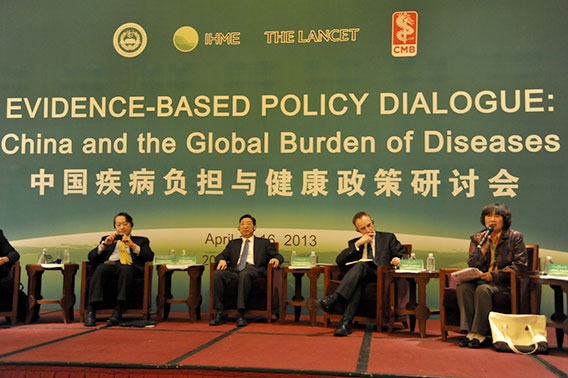China and the Global Burden of Disease: An Evidence-Based Policy Dialogue

On April 16, 2013, 115 international scientists and academics convened with Chinese policymakers in Beijing to review policy implications of a China Global Burden of Disease (GBD) study tracking disease, disability, and demographic health trends in China. The Policy Dialogue, organized by Peking Union Medical College (PUMC), the Institute for Health Metrics and Evaluation at the University of Washington (IHME), The Lancet, and the China Medical Board presented the results of a China-focused study based on the Global Burden of Disease Study 2010 (GBD 2010) methodology. The Study results show how rapid socioeconomic development has generated many health accomplishments but also fresh challenges. Chinese life expectancies have increased while death and illness caused by infectious disease, especially child mortality, have been significantly reduced. Non-communicable diseases (NCDs) like cardiovascular disease and cancer have risen to become the primary cause of death, and the disability burden on the Chinese people such as musculoskeletal impairment, depression and mental disorders, and chronic disease, has risen markedly. China’s greatest risks to health damage come from dietary risks, high blood pressure, tobacco, and environmental threats from air pollution.
The Policy Dialogue discussed the policy implications of the Study results through three panel sessions focused on China’s major transitions in disease, disability, and demography. Experts on the panels agreed that policy responses must extend across multiple sectors, including health, economic planning, environment, urban design, and social insurance. Discussants also emphasized the need for strengthened management and prevention. Targeted public health programs focused on curbing tobacco consumption and promoting healthier eating habits could significantly reduce China’s cancer, cardiovascular, and cerebrovascular disease burdens. “Even modest reduction of behavior risk factors could generate substantial health benefits,” says Dr. Yang Gonghuan, who headed the China Study.
Professor Yang and her team will continue to work on collection and dissemination of disease burden research in China, focusing next on provincial-level, rather than national-level, studies, to support more focused policymaking and health interventions.


